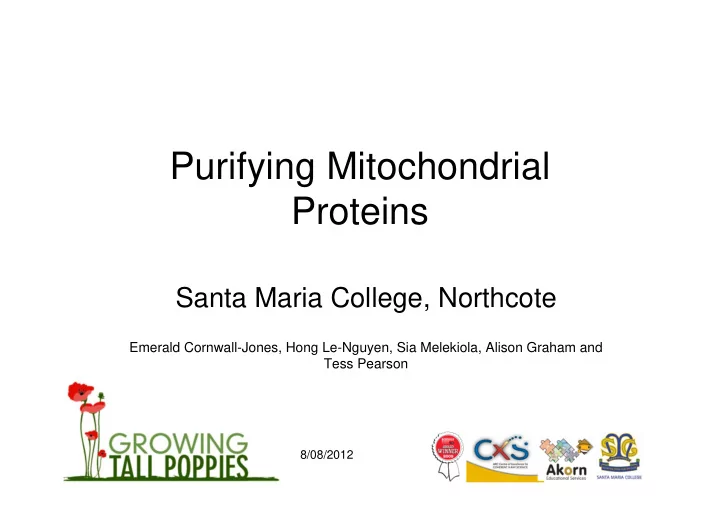

Purifying Mitochondrial Proteins Santa Maria College, Northcote Emerald Cornwall-Jones, Hong Le-Nguyen, Sia Melekiola, Alison Graham and Tess Pearson 8/08/2012
What we believed science was “Science is only for nerds.” – Sia “Science is mainly practical experiments.” –Tess “All scientists are like Sheldon from the Big Bang Theory.” – Hong “There is only one large discipline of Science.” – Alison “Different fields of Science can not be combined.” - Emerald 8/08/2012
How is this project related to a real world problem? Defects in assembly factors will lead to a decrease in complex I. By purifying these proteins, we hope to indentify their structure and understand how they function. 8/08/2012
What do we mean by integrated science? Different disciplines of science working together. The CXS combines Biology and Physics in order to use X-rays to investigate biological samples. 8/08/2012
The project goal To purify the proteins CIA30 and ACAD9 from bacteria. By doing this, we hope to understand the specific functions of these proteins. Also, where the CIA30 and ACAD9 protein goes in the cells. 8/08/2012
CIA30 Purification 0 24 T S UB W E1 E2 E3 E4 E5 E6 8/08/2012 8/08/2012
Merge CIA30 Microscopy TOM20 8/08/2012 GFP
ACAD9 Purification 0 24 T S UB W E1 E2 E3 E4 E5 E6 8/08/2012 8/08/2012
ACAD9 Microscopy GFP TOM20 Merge 8/08/2012 8/08/2012
Further Areas or Questions to Investigate After spending our week in the Biochemistry lab we would be interested in investigating the following: How do proteins mutate? If we used a different method would our results have been more accurate? What would happen to Mitochondria if there are too many assembly factors? 8/08/2012
What was interesting about the science that is happening in this lab? The techniques and procedures such as using cancer cells from 60 years ago to look at the proteins in cells. The contribution towards the understanding and treatment of mitochondrial diseases. Being able to observe organelles through a microscope. 8/08/2012
Why Should We care about the Research? It brings us closer towards being able to understand and diagnose mitochondrial diseases. These diseases include; Parkinson’s Alzheimer's Neurodegenerative diseases Cardiomyopathy Diabetes 8/08/2012
How is it relevant to other sciences? 8/08/2012
How Has Our View of Science or Scientists Changed? “Science is for anyone who is interested in it, you don’t have to be nerd to like science!”- Sia “Science is more than just experiments. It requires research and communication.” –Tess “Scientists are friendly and are great at communicating.” –Hong “There are many different fields of Science.” –Alison “Different disciplines of Science can work together.” -Emerald 8/08/2012
What Have We Learnt? Experimental Techniques: Purify protein, ran gels to analyze the proteins, staining gels. Use Different Instruments: Centrifuge, microscope, rotor wheel, roller, Nickel Resin. Team Work: Cooperation and effective communication. Deeper/ More Meaningful Thinking: Analyzing results and understanding how they contribute to the final solution. 8/08/2012
What choices have opened up to me In Possible Career Choices? After this experience we are more aware of what scientists are doing for our society. We have been made aware of the many different career choices that are available to us in the different fields of science. 8/08/2012
How has being part of GTP changed my appreciation for Biochemistry? Going to La Trobe University and experiencing what Biochemists do is a privilege that we all appreciated greatly. During the week we were able to have a hands on experience by working closely with scientists in the lab. We performed multiple experiments that enhanced our knowledge and appreciation of biological science. The Growing Tall Poppies program has helped us all value the different aspects of biological science. 8/08/2012
Acknowledgements The ARC Centre of Excellence for Coherent X-Ray Science The Growing Tall Poppies Program Developer: Dr Eroia Barone-Nugent Santa Maria College NAB Schools First & Catholic Education Office The Ryan Lab – Biochemistry Lab of La Trobe University Supervisor/Awesome Mentor: Luke Formosa 8/08/2012
Recommend
More recommend